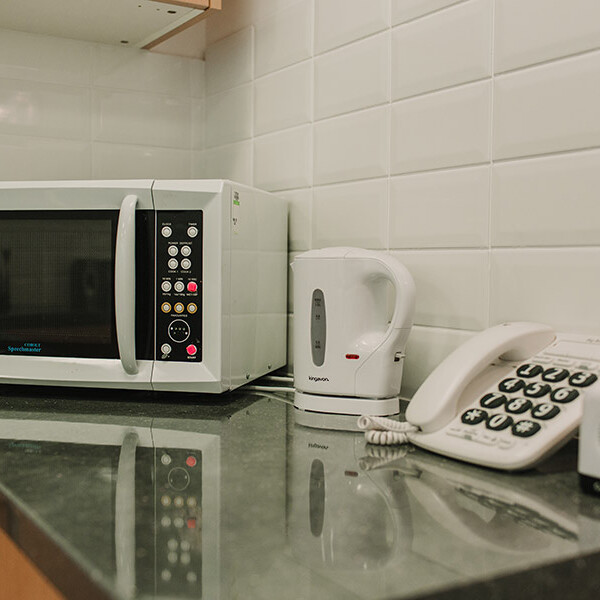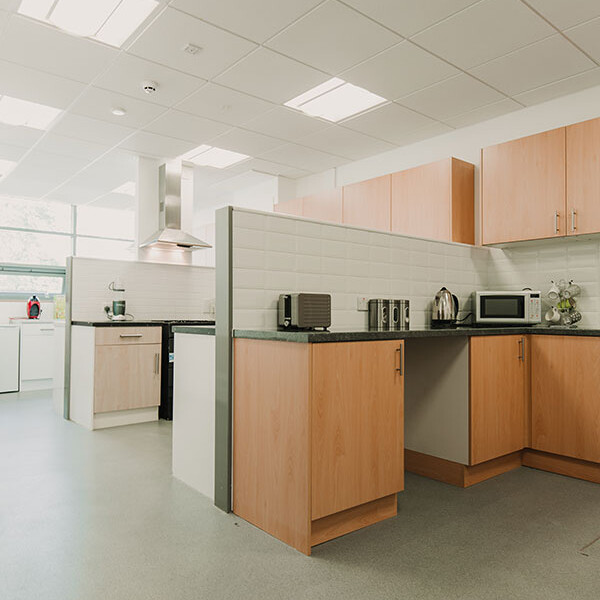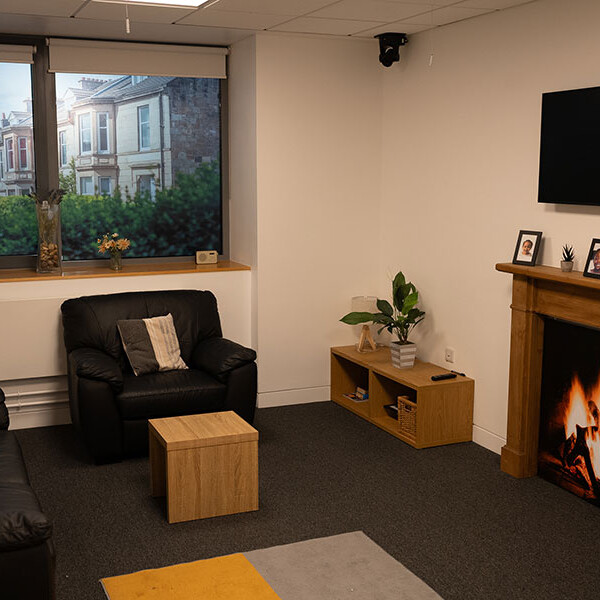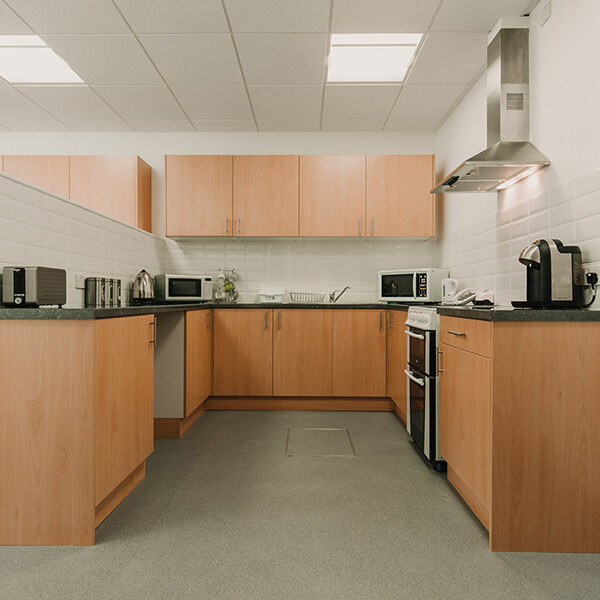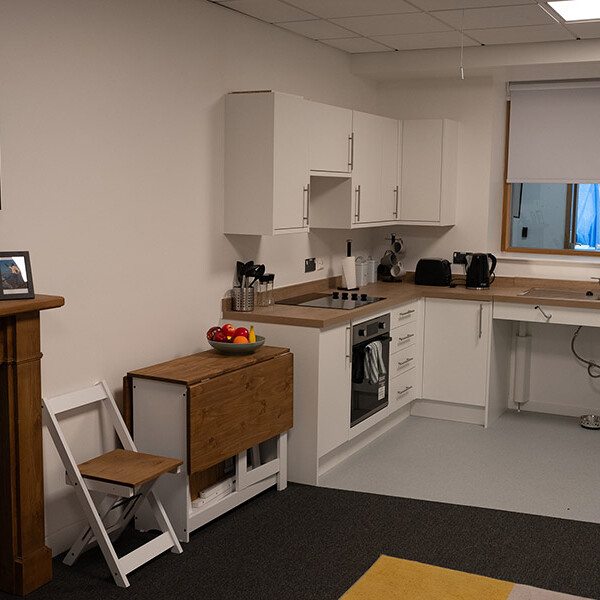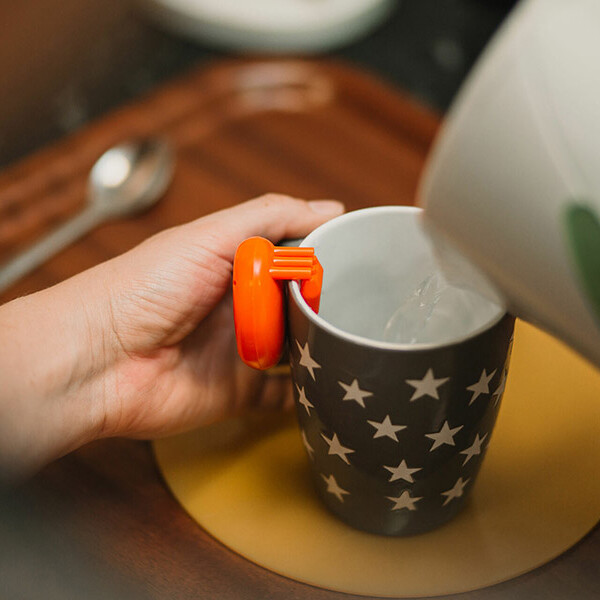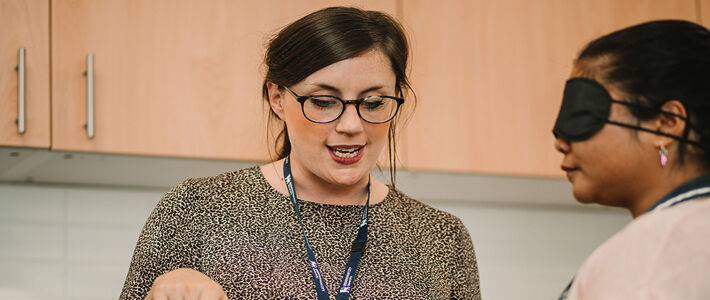
Vision Rehabilitation Specialist (Adults) Higher Apprenticeship - FdSc
Currently viewing course to start in 2025/26 Entry.
The Vision Rehabilitation Specialist Apprenticeship aims to train the next generation of Vision Rehabilitation Specialists. As an apprentice, you will work for your employer while also completing off-the-job training with us at the University....
- Level Apprenticeship
- Study mode Blended Learning
- Award FdSc
- Start date September 2025
- Subject
- Location City South
This course is:
Overview
The Vision Rehabilitation Specialist Apprenticeship aims to train the next generation of Vision Rehabilitation Specialists. As an apprentice, you will work for your employer while also completing off-the-job training with us at the University.
Your learning with us will be structured into blocks, allowing you to develop the knowledge, skills and behaviours required by the Vision Rehabilitation Specialist Apprenticeship Standard. Gradually, you will be able to put your learning into practice in the workplace, enhancing the lives of people with vision impairment.
Additional costs
This course involves some additional costs for equipment and travel. You will need to purchase a long cane and two cane tips (pencil and roller marshmallow) to use in practical training sessions at the University as well as general skills and techniques practice outside the block learning weeks. Approximate costs for this are £34 the cane and £15 for the tips. All apprentices will be measured for an appropriate length cane during the course induction week. You will then need to purchase the correct length long cane for sessions commencing in November of Semester One. Apprentices will also be expected to pay for bus, rail, and tram tickets for practical technical training sessions on using public transport. Public transport training is likely to take place on eight of the orientation and mobility training days.
How to apply
You apply for a degree apprenticeship in the same way you apply for a normal job. You’ll need to submit an application to the recruiting employer.
Employers advertise degree apprenticeships throughout the year and there is no application cycle like there is with university applications. The vacancy will state when the application deadline is, and when the apprenticeship is due to start.
You cannot apply directly to the University for a degree apprenticeship. To apply for an apprenticeship, you first need to find one that you are interested in applying for.
Find an Apprenticeship is the government website where the majority of apprenticeship vacancies are advertised. It only shows live jobs (so it won’t tell you previous vacancies, nor what’s coming up), so you will need to check it regularly to see new vacancies as the employers advertise them.
Once you have secured your place with an employer, you can apply to BCU. Please complete the application form and send to: rehabadmissionsquery@bcu.ac.uk
Information for Employers
Interested in employing an apprentice for your organisation? Find out more about what’s involved.
Entry requirements
Evidence of one of:
GCSE at grade 4 or above in English Language and Maths, or equivalent e.g. GCSE grade C, key skills level 2, adult literacy level 2 or CSE grace 1 will be accepted.
Plus one of the following:
- Level 3 NVQ or Diploma or equivalent (full award)
- 2 or more A-Levels (DD/48 UCAS tariff points) or a BTEC ordinary National Diploma
- Level 2 NVQ or Diploma (full award) plus a written paper (details of content will be provided by the admissions tutor post application)
Additional entry requirements:
- Prospective students should demonstrate the ability to undertake studies at Foundation Degree level.
- Personal experience or experience of working with people with vision impairment is desirable. Relevant experience in other health and social care settings will also be taken into consideration.
- All applicants are required to be aged 17 years or above on entry
- All applicants must have access to, and be able to use, broadband internet and e-mail facilities, as a proportion of this course is delivered through these media. Please see IT specification for further details.
- This course requires students to learn to teach people with vision impairment in high-risk situations, such as crossing roads independently, working safely in the kitchen and managing home and personal care. It is a requirement that students will already be competent themselves in these daily activities, and have the capacity to monitor the safety of those they are learning to teach. The application form asks you to confirm this requirement.
- If English is not your first language, an IELTS score of 6.0 overall (or equivalent) is required.
- Most of our students are not school leavers, and a number have chosen this course in order to change their career or return to work.
- Mature applicants without formal qualifications must demonstrate personal or professional experience within a health and social care profession and the ability to study at Foundation Degree level.
Why Choose Us?
- Apprenticeships offer work based learning – the opportunity to build on existing knowledge and skills.
- You will be supported by highly experienced tutors and work based clinical educators to support you both with your studies and in practice.
- We have excellent facilities on campus including state-of-the-art equipment, study spaces and an extensive library of learning resources to support you with your studies.
- Study alongside other individuals who have experience within your industry. You will be able to build valuable networks, sharing best practice and supporting you with your future career opportunities.
- At the end of the course, you will have two years work experience, and an additional qualification, without taking on any student debt.
Facilities & Staff
We have invested over £400 million in our facilities, including an upgrade to our Skills and Simulation facilities at City South Campus. We boast up-to-date, innovative facilities that simulate the real situations that you may come across in the workplace. These resources are essential in offering you a hands-on introduction to health and social care practice.
Home Environment Room
This space is used to simulate non-clinical settings, as not everything health professionals deal with is hospital based. This is used for simulations of activities such as home visits, home births and supporting people to become independent in their own home.
Assisted Living Space
This space replicates a flat and is used for scenarios such as home visits. The sitting room area provides a different space to practise skills and simulations and work with service users and other students.
Assisted Kitchen
This specially designed kitchen has different areas where you can practice cooking, cleaning, boiling the kettle etc., with someone who has actual or simulated vision impairment. There are adapted devices to help, and simulation glasses for you to wear to experience vision impairment.
Our staff
Peter Cooke
Senior Lecturer/Admissions Tutor
Peter’s connection with the vision impairment sector began following his diagnosis of Retinitis Pigmentosa when he was 15 years old. Early volunteering experience working with children and young people fostered an intrinsic interest in developing a career involving work with those living with serious sight loss.
More about PeterDavid Bignell
Course Lead BSc (Hons) Qualified Habilitation Specialist (Children and Young People)
David is the Course Lead for BSc (Hons) Qualified Habilitation Specialist. David has also been the Course Lead for the Foundation Degree in Rehabilitation Work (Vision Impairment) and the BSc (Hons) Specialist Complex Needs Rehabilitation Work top up degree.
More about David